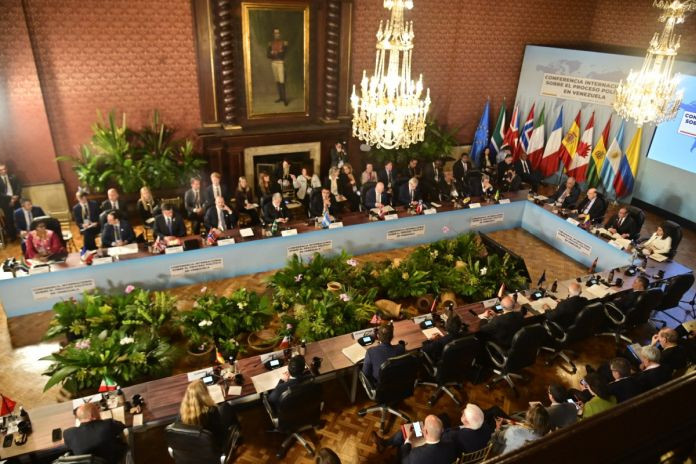By Andreína Chávez Alava
CARACAS, (venezuelanalysis.com) – The International Conference on the Political Process in Venezuela was held Tuesday in Bogotá, Colombia, with representatives from 19 countries and the European Union (UE) and concluded without concrete developments.
The summit began with a televised speech by Colombian president Gustavo Petro before closed-door discussions took place. Afterward, Colombian foreign minister Alvaro Leyva read a communique to the press outlining “common ground” positions reached by the attendees to help jumpstart the paralyzed dialogue process between the Venezuelan government and US-backed opposition.
The first point in the agenda was “establishing an electoral timetable that allows free and transparent elections with full guarantees for all Venezuelan actors.” Leyva added that the attendees considered “the importance of taking into account the recommendations of the European Union Electoral Observation Mission made in 2021,” in reference to the regional vote that saw the return of most opposition parties to the electoral arena and yielded a significant victory for Chavismo.
The international forum likewise asserted that the continuation of the Norway-brokered talks would depend on the implementation of the social agreement reached between both parties last November. The Mexico accord established a US $3 billion social fund drawn from Venezuelan assets seized by Washington and allies to invest in education, healthcare and infrastructure repairs. However, the resources have yet to be made available.
Minister Leyva remarked that agreements between the Venezuelan delegations should happen “in parallel with the lifting of the various sanctions” against the Caribbean nation.
The other points discussed by the international delegations were less explicit. Leyva stated that a group of representatives would inform president Maduro and the hardline opposition about the summit’s results to receive their “evaluation and comments” while a second meeting in Bogotá will be scheduled to follow up on developments. Finally, the attendees agreed that Petro’s remarks at the conference will be considered a “starting point” to assess the upcoming steps.
During the summit, Petro urged an end to sanctions against Venezuela and recognized the economic suffering inflicted on the population, stating that “Venezuelan society does not want to be sanctioned because the sanctions have fallen on the people.”
“America cannot be a space of sanctions, it has to be a space of freedom and democracy,” stressed the Colombian president. He also backed the Venezuelan opposition’s demands for “electoral guarantees” ahead of the 2024 presidential vote and called for Venezuela to re-enter the Inter-American Human Rights System.
The Bogotá summit was organized by Petro with blessing from the Maduro government and the US-backed opposition, despite the parties not participating directly. Petro and Maduro have held several meetings after the countries normalized diplomatic relations and re-opened their shared border.
On April 20, the Colombian leader met with president Joe Biden in Washington and requested the gradual removal of economic sanctions against Venezuela, adding that the objective of the international summit was “no sanctions and more democracy.” The US government sent Jonathan Finer, who serves as White House Deputy National Security Advisor, to attend the Bogotá-held meeting. US outlets had speculated that Washington’s commitment would be reflected by the participating representative.
Representatives from Germany, Argentina, Barbados, Bolivia, Brazil, Canada, Chile, Spain, France, Honduras, Italy, Mexico, Portugal, the United Kingdom, South Africa, and Turkey also attended the conference as well as the prime minister of Saint Vincent and the Grenadines, Ralph Gonsalves, and the EU High Commissioner for foreign affairs Josep Borrell.
Following the summit’s conclusions, the Venezuelan government issued a communique “acknowledging the deliberations.” Caracas reiterated the “imperative need” to lift the wide-reaching sanctions “which constitute an aggression against the entire Venezuelan population.”
“We likewise demand the return of the assets belonging to the Venezuelan state and illegally retained by foreign countries and financial institutions as well as the immediate release of the Venezuelan diplomat Alex Saab, unjustly detained in the US,” read the statement.
The Maduro government reminded the opposition and foreign actors that the resumption of negotiations hinges on the “full compliance” of previous accords between the two parts.
Earlier on Tuesday, president Maduro wished the conference was a success “for the peace of Venezuela, Latin America and the Caribbean” and stated that his government was willing to return to the dialogue table in Mexico as soon as the social fund resources were released.
“We do not accept less from this conference in Bogotá than the lifting of all sanctions so that Venezuela has commercial, financial and economic freedom,” stressed Maduro in a televised broadcast.
Since 2017, the US has levied financial sanctions against the Venezuelan state oil company PDVSA followed by a full-fledged oil embargo in 2019 and secondary sanctions throughout 2020. The measures have crippled the country’s oil output, exacerbating an economic crisis and migration wave. Besides the oil industry, the US Treasury Department has targeted key economic sectors such as mining, banking and essential imports. Washington and allies have gone on to block, seize or freeze a host of Venezuelan assets abroad.





